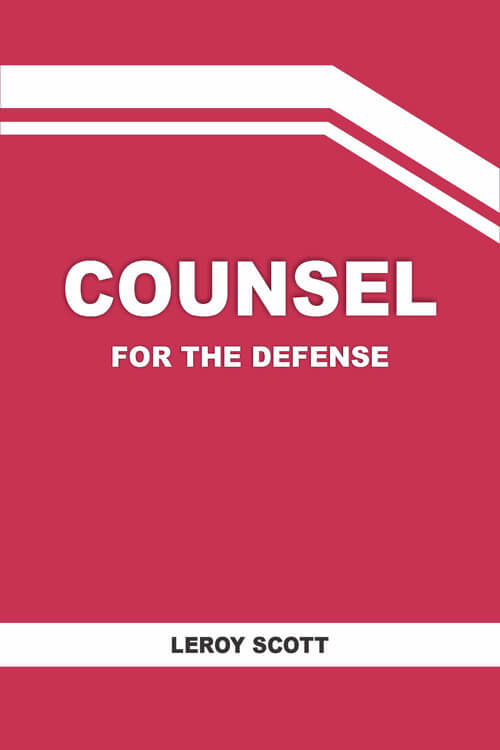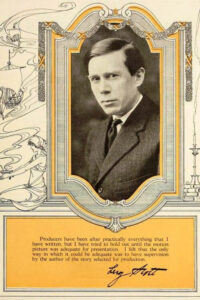
Counsel for the Defense
The room was thick with dust and draped with ancient cobwebs. In one corner dismally reposed a literary junk heap—old magazines, broken-backed works of reference, novels once unanimously read but now unanimously forgotten. The desk was a helter-skelter of papers. One of the two chairs had its burst cane seat mended by an atlas of the world, and wherever any of the floor peered dimly through the general débris it showed a complexion of dark and ineradicable greasiness. Altogether, it was a room hopelessly unfit for human habitation; which is perhaps but an indirect manner of stating that it was the office of the editor of a successful newspaper.
Before a typewriter at a small table sat a bare-armed, solitary man. He was twenty-eight or thirty, abundantly endowed with bone and muscle, and with a face——But not to soil this early page with abusive terms, it will be sufficient to remark that whatever the Divine Sculptor had carved his countenance to portray, plainly there had been no thought of re-beautifying the earth with an Apollo. He was constructed not for grace, but powerful, tireless action; and there was something absurdly disproportionate between the small machine and the broad and hairy hands which so heavily belabored its ladylike keys.
It was a custom with Bruce to write the big local news story of the day himself, a feature that had proved a stimulant to his paper’s circulation and prestige. Tomorrow was to be one of the proudest days of Westville’s history, for tomorrow was the formal opening of the city’s greatest municipal enterprise, its thoroughly modern water-works; and it was an extensive and vivid account of the next day’s program that the editor was pounding so rapidly out of his machine for that afternoon’s issue of the Express. Now and then, as he paused an instant to shape an effective sentence in his mind, he glanced through the open window beside him across Main Street to where, against the front of the old Court House, a group of shirt-sleeved workmen was hanging their country’s colors about a speakers’ stand; then his big, blunt fingers thumped swiftly on.
He had jerked out the final sheet and had begun to revise his story, making corrections with a very black pencil and in a very large hand, when there sauntered in from the general editorial room a pale, slight young man of twenty-five. The newcomer had a reckless air, a humorous twist to the left corner of his mouth, and a negligent smartness in his dress which had its origin elsewhere than in Westville.
The editor did not raise his eyes.
“In a minute, Billy,” he said shortly.
Read or download Book
Leroy Scott
Leroy Scott (May 11, 1875 – July 21, 1929) was an American writer of novels and screenplays.
Biography
Scott was born in Fairmount, Indiana, on 11 May 1875. His father was a minister with the Religious Society of Friends. He graduated from Indiana University in 1897. His writing career began with three years of experience as a reporter; he worked at a Louisiana newspaper owned by his brother. Later (1900–01) he became assistant editor of the Woman’s Home Companion.
Scott was also a social activist. After gaining experience at the Hull House in Chicago, Scott served as assistant headworker at the University Settlement House in New York City in 1902–03. It was there that he met—and later married on 27 June 1904—Miriam Finn, a Russian Jewish writer. Around this same time, Scott was an officer of the Intercollegiate Socialist Society, of which he was a founder. After he departed from the University Settlement, Scott and his wife came to live in Greenwich Village at “A Club”, a writers’ cooperative housed in an old mansion on Fifth Avenue that became known as a “radical center.” They had one child, a daughter. In 1906, Scott helped arrange accommodations for Maxim Gorky during his visit to the United States. In 1907, Scott and his wife visited Russia. To research his book about labor relations, The Walking Delegate (1905), Scott joined the Structural Iron Workers Union. In addition to novels, Scott became involved in the movie industry, where he accumulated numerous writing credits, as well as an acting credit in one film. When Goldwyn Pictures determined a need to produce movies in New York as well as on the West Coast, Scott’s Partners of the Night was chosen as the first work. Scott drowned in Lake Chateaugay, near Plattsburgh, New York, on 21 July 1929.
Works
Children of the Whirlwind
The Walking Delegate (1905)
To Him that Hath (1907)
The Shears of Destiny (1910)
Vocations, ed. William DeWitt Hyde. Hall and Locke Company. Boston. Vol. 1. The Mechanic Arts. Richard C. Maclauren ed. (1911). “Selden’s Explosion Buggy”. p. 343
Counsel for the Defense (1912)
No. 13 Washington Square (1914)
Graft (1915)
Partners of the Night (1916)
The Sturdy Oak; a composite novel of American politics by fourteen American authors (ch xiv) (1917)
Mary Regan (1918)
A Daughter of Two Worlds: A Novel of New York Life (1919)
Cordelia the Magnificent (1923)
The Heart of Katie O” Doone (1925)
Folly’s Gold (1926)
The Trail of Glory (1926)
The Living Dead Man (1929)






